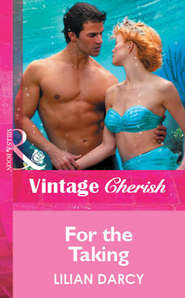По всем вопросам обращайтесь на: info@litportal.ru
(©) 2003-2025.
✖
It Began with a Crush
Автор
Год написания книги
2019
Настройки чтения
Размер шрифта
Высота строк
Поля
“Hi, Mr—” She stopped. It wasn’t Art Capelli, with his tanned and lined sixtysomething face, his wiry gray hair and fatherly brown eyes. It was Joe, his son.
Joe, whom she hadn’t seen in probably fourteen years. Longer.
Joe, with the sinfully gorgeous looks that began with his thick dark hair and ended with his perfect olive-skinned body, and encompassed pretty much every other desirable male attribute in between.
Cocky, egotistical Joe, who’d always known all too well how irresistible he was and had played on it for everything he was worth.
Possibly, she was blushing already.
“Hi,” he said. They looked at each other. He lifted his head from the wheeled roller-thingy that allowed him to slide easily beneath a vehicle. “Mary Jane, right?”
“Yes.”
“I saw your name in the book.” And probably wouldn’t have recognized her in a police lineup if he hadn’t.
“Where’s your dad?” she asked, and it sounded abrupt and clumsy.
He didn’t answer right away, occupied with levering his strong body up off the roller-thingy so he could stand. “I’m helping him now. Taking over, really. His health isn’t that great.”
Once he was standing, she could see him a lot more clearly. He hadn’t changed, she quickly concluded. He was every bit as good-looking as he’d been in high school. Better-looking, in fact. Her own eye for a man’s looks had matured with the years, and she liked the laugh lines around his eyes and mouth, and the fine, scattered threads of silver in the short but still thick hair that framed the top half of his face.
“Right. I’m sorry to hear that,” she answered him. “I mean, that he’s not well. Not sorry you’re helping out. Obviously.”
Smooth, Mary Jane. Real smooth.
There were a hundred questions she wanted to ask. What happened to the Hollywood plan? Was Joe back here for good, or just as an interim arrangement because his dad wasn’t well? Wasn’t there someone else who could take over the garage? What had gone wrong?
It was ridiculous how shocked she felt at seeing him, and how instinctively she’d gone back in time about eighteen years to when they were in high school together and she’d loathed him more than any other guy in school.
Yes, loathed him.
Insist on that a little more, Mary Jane. Protesting too much? Never!
She’d loathed her own reaction to him even more. He’d been so cocky back then, so magnetic and sure of himself, wearing his sense of his own sparkling future like an Armani suit. No, wait a minute. Not a suit. He was rougher than that. Make it a biker jacket, black Italian leather.
She’d tried so hard not to look at him, not to notice him, and to stay immune to the charm that oozed from him, the—what were they called, pheromones or something—that made her heart beat faster if they merely passed each other in a corridor.
The ones that made her tongue turn into a flapping fish in her mouth, and made her blush and giggle if he said something arrogant and cheeky in class. Arrogant and cheeky and usually pretty dumb, because he never did the required reading. If he ever happened to catch her looking at him after one of those smart-mouth comments, she always glared back, just to make sure he wasn’t in the slightest danger of thinking she might have a crush on him.
And now here he was in his father’s dilapidated garage, where he used to help out in his teens, hands stained with engine grease, forehead lightly sheened with grimy sweat, fixing cars for a living.
While she struggled to find the right thing to say, he pulled the overalls down to his waist, laying bare a dark blue T-shirt that molded to his chest and casually showed off the toned muscles and washboard abs. He grabbed a water bottle from a benchtop and took a gulp, then took a towel and wiped it across the sweaty, grimy forehead.
She thought she should probably feel sorry for him for being here, or maybe maliciously pleased at the contrast between his openly paraded ambitions of wealth and Hollywood stardom back in high school, and the place he’d ended up. Right back where he’d started in his dad’s garage.
And yet she didn’t feel any of that. Instead, the emotions that washed through her were curious and empathetic and wry and—
“Life’s a funny thing, huh?” Joe said quietly with a half smile, and she felt the blush heating her cheeks in reality now, not simply in her imagination. How long since she’d done that? Blushed? A hundred years?
“Um, yes. Yes, it is.” She took in a dragging breath and breathed in him, along with the air—his slightly salt scent, his body heat, a hint of some tangy and irresistible male grooming product, and the faint odor of engine oil that should have been off-putting but for some reason wasn’t.
Jeepers, how did the man do this? Less than a minute in his company and she’d already been knocked sideways by the way he looked, and even the way he smelled, for pity’s sake.
She cleared her throat quickly, and there was a shift as they both pulled back onto a businesslike footing. She really was not going to ask all those questions about what he’d been doing since college and why he wasn’t by this time a Hollywood heartthrob on the level of George Clooney, Bradley Cooper or Johnny Depp, or maybe a high-powered casting agent or film director.
And if she wasn’t going to ask, then even less did he look as if he wanted to tell her.
“So, the car,” he said. “Regular service, you said, plus you’ve been having a couple of problems with it?”
“It’s making a noise.”
He gave her his father’s look, the tolerant and reproachful one, but with an additional hint of smoke that Mr. Capelli had never worn on his face in his life. Again, it took Mary Jane right back to high school and made her furious with herself. Back then, she used to think he did it on purpose—and maybe he had—because the girls fell for it like ninepins. She’d bent over backward to make sure it never worked on her.
If it was physically possible for a pair of male eyebrows and the corners of a male mouth to give the equivalent of a seductive drawl, then that was what his were doing, then and now. But today he didn’t look as if he was doing it on purpose. It was just part of his face, an unconscious habit, something that betrayed a dry sense of humor.
“A noise,” he said patiently.
“Yes.” She tried to produce it. “Rgrk-rgrk-rgrk. Like that. Sort of.”
To her relief, he didn’t laugh, just said very plainly, “I’ll take a look, and give you a call when I know what’s going on.”
“Uh, thanks, Cap. Yes, that would be great.”
There was a silence as she realized what she’d said. Cap. Everyone had called him that in high school, but she had no idea if they did anymore.
He’d noticed the nickname, too. “Make it Joe,” he said.
“I’m sorry.”
“Cap is... Yeah. I don’t go by that now.”
“Sorry,” she said again. And for some reason remembered something she’d learned in passing—she couldn’t remember where or when—that Joe Capelli was also the name of a character in a shoot-’em-up video game.
“No big deal,” the non-computer-generated Joe said. “Do you need a ride somewhere?”
“My sister’s picking me up. She should be here any minute.”
“I’ll call you later, then, when I know what’s going on with the engine.”
“Thanks. Um, say hi to your dad for me. Give him my best wishes.”
“Will do.”
She got herself out of the grease-smelling workshop and into the June air, just as her sister Lee pulled onto the concrete apron at the front of the garage.
Lee was engaged to be married and five and a half months pregnant, beyond the tired and queasy first trimester and not yet into the big and uncomfortable third trimester, and she looked radiantly energetic, happy and alive. Her caramel-colored hair was thick and shiny in its casual ponytail, and her skin was glowing. “So what’s the noise?” she said, after Mary Jane had slid into the front passenger seat.
“Don’t know yet. He’ll take a look at it and call to let me know.”











